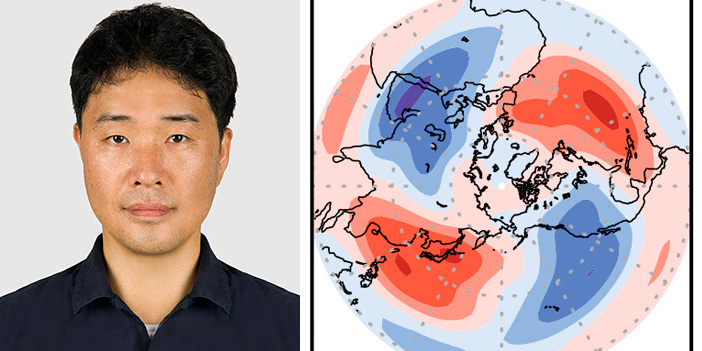커뮤니티
부경투데이
- 국립 부경대학교의 다양한 모습과 소식을 접하시면 부경대학교가 한번 더 가까워집니다.
| Research | 북극 온도 상승이 제트기류에 미치는 영향은?( What are the effects of the jet stream as the Arctic temperature rises?) | |||
| 작성자 | 대외협력과 | 작성일 | 2022-09-22 |
| 조회수 | 838 | ||
| Research | 북극 온도 상승이 제트기류에 미치는 영향은?( What are the effects of the jet stream as the Arctic temperature rises?) | |||||
 |
대외협력과 |  |
2022-09-22 |  |
838 |
“북극 온도 상승, 제트기류 변동 키운다.”
- 부경대 문우석 교수팀, 세계적 학술지 <PNAS>에 연구결과 게재

△ 문우석 교수(왼쪽), 북극 온도 상승과 제트기류 변동 이미지.
세계적으로 이상 기후에 대한 우려가 커지는 가운데 북극의 온도 상승이 제트기류 변동에 영향을 미친다는 연구결과가 나와 관심을 모은다.
국립부경대학교 문우석 교수(환경대기과학전공)팀은 미국 예일대학교 존 웨틀라우퍼(John Wettlaufer) 교수와의 공동연구를 진행하고, 이 같은 연구결과를 담은 논문 ‘Wavier jet streams driven by zonally asymmetric surface thermal forcing’을 최근 세계적 학술지인 <PNAS>(미국국립과학원회보)에 게재했다고 밝혔다.
북극이 전 지구 평균보다 4배나 빠른 속도로 뜨거워지는 가운데, 북극의 빠른 온도 상승이 이상 기후 발생에 어떤 관련이 있는지에 대해 최근 관심이 높아지고 있었다.
지금까지는 북극의 온도 상승으로 중위도 제트기류가 흔들릴 수 있다는 가설과 함께, 중위도 제트기류의 변화에 북극의 역할은 제한적일 수 있다는 반대 연구도 나오면서 논란이 지속됐지만, 두 주장 모두 이론적 근거나 실험적 증거가 부족한 상황이었다.
문 교수 연구팀은 이번 연구에서 이론연구와 수치 시뮬레이션 등 컴퓨터 실험을 진행해 학계에서는 처음으로 이론적 근거를 제시했다.
연구팀은 연구를 통해 북극의 온도 상승이 심화할수록 제트기류의 세기가 약해지고, 그 세기가 특정 값 이하로 떨어지게 되는 경우 지표면에 국한된 반응이 아닌 대기 상층까지 연결된 대규모 파동 현상들이 나타날 수 있음을 입증해냈다.
제트기류의 평균적인 속도가 떨어지면 떨어질수록 제트기류의 출렁거림 역시 강해질 수 있다는 것이다.
문 교수는 “이번 연구로 북극의 변화가 그 지역만이 아닌 전 지구적, 특히 우리가 살고 있는 중위도 지역의 극단적 기상현상을 증가시킬 수 있는 중요한 요소라는 점을 명확히 했다.”라며, “특히 중위도 한가운데 위치한 우리나라의 기후변화와 그에 따른 기상 재해의 심화 정도를 밝히기 위해 북극의 변화를 동시에 연구하는 것이 필요하고, 매년 극지를 방문해 북극 상태를 연구하는 극지연구소의 역할이 더욱 강화돼야 한다.”라고 말했다. <부경투데이>
“The arctic temperature rises may affect the jet stream pattern.”
- Prof. Moon Woo-Seok's research team at PKNU published research results in <PNAS>, a famous global academic journal
Recently, as concerns about abnormal climates are growing around the world, a research result showing that the increase in temperature in the arctic affects the fluctuations of the jetstream is attracting academia attention.
Professor Moon Woo-Seok’s team at Pukyong National University (Environmental atmospheric sciences) conducted joint research with professor John Wettlaufer from Yale university, USA, and published a paper ‘Wavier jet streams driven by zonally asymmetric surface thermal forcing' containing the research results recently and announced that it was published in <PNAS> (Proceedings of the national academy of sciences of the United states), a world-renowned academic journal.
With the arctic warming four times faster than the global average, there has been growing interest in recent years about how the rapid rise in temperature in the arctic is related to the occurrence of abnormal climates.
Until now, controversy has continued, with the hypothesis that the mid-latitude jet stream may be shaken due to an increase in the Arctic temperature, and opposing studies suggesting that the role of the Arctic in the change of the mid-latitude jet stream may be limited. However, both claims lacked theoretical or experimental evidence.
In this study, prof. Moon's research team conducted computer experiments such as theoretical research and numerical simulations to present a theoretical basis for the first time in the academia.
Through the study, the research team proved that the intensity of the jet stream weakens as the arctic temperature rises, and that when the intensity falls below a certain value, large-scale wave phenomena that connect to the upper atmosphere can occur rather than a reaction limited to the surface of the earth.
The research team suggests that as the average velocity of the jet stream falls, the wave of the jet stream can become stronger as well.
Prof. Moon said, “The study clarifies that temperature changes in the Arctic are an important factor that can increase extreme weather events not only in the region but also globally, especially in the mid-latitudes where we live,” and he added, “Especially, it is necessary to simultaneously study changes in the Arctic in order to find out the extent of climate change in Korea located in the middle of the mid-latitudes and the severity of meteorological disasters. I also think that the role of the Polar Research Institute, which visits the polar regions every year to study the climate conditions of the Arctic, should be further strengthened.” <Pukyong Today>